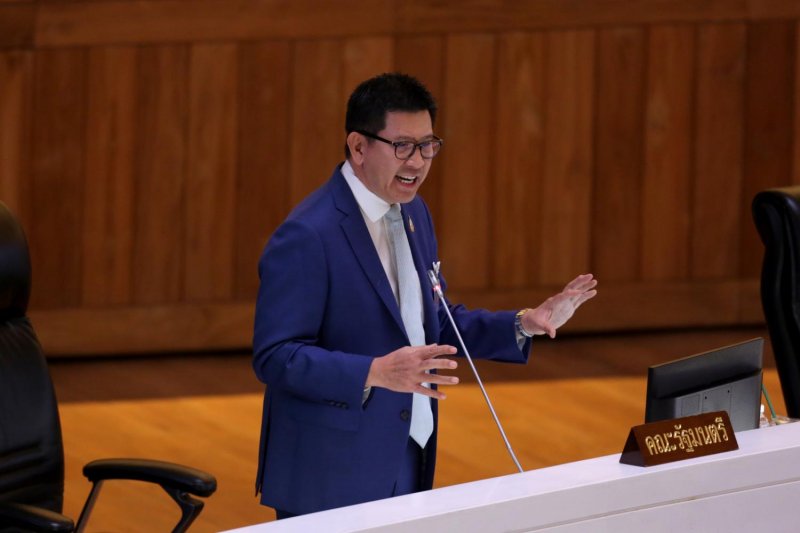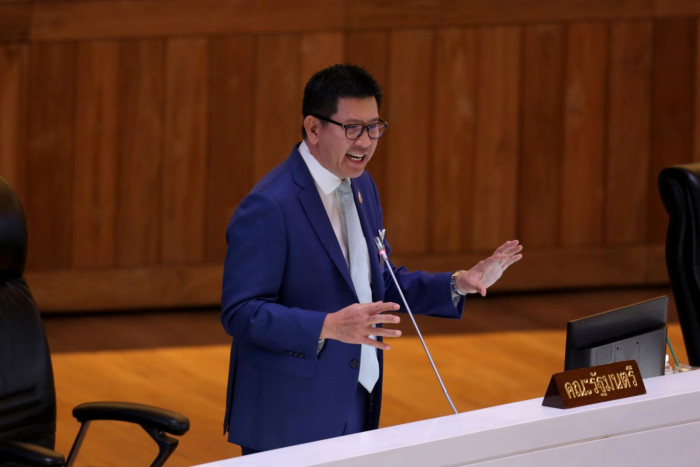
Ekniti: Vows to tackle worsening economic situation
Finance Minister Ekniti Nitithanprapas has underscored the urgent need to accelerate government spending, describing it as the only remaining engine capable of rescuing Thailand’s economy from its current malaise.
Speaking on the second day of the government’s policy statement presentation to parliament on Tuesday, Mr Ekniti, who also serves as a deputy prime minister, warned that Thailand’s economy this year is akin to a vehicle “heading off a cliff”, powered by four main engines — most of which are now faltering or stalling.
Exports, which were previously bolstered by front-loaded shipments ahead of US tariff measures under the Trump administration, saw healthy growth of around 3% in the first half of the year. However, following the imposition of tariffs, this momentum has slowed significantly.
According to the Bank of Thailand’s data, private consumption in July experienced negative growth for the first time in over a year. This decline is attributed to waning consumer confidence, longstanding household debt problems, and stagnant incomes. As a result, this economic engine is weakening and on the verge of stalling as well.
Regarding private sector investment, capacity utilisation currently stands below 60%, a figure showing that this third engine is also nearing a standstill, he said. “Although the smallest in scale, government spending is now the only engine still operational and thus critical to economic recovery,” Mr Ekniti said.
He said projections from three state economic agencies suggest Thai GDP will grow by 1.7% this year. However, the outlook for the fourth quarter is bleak, with forecasted growth of just 0.3%.
“It is clear that the economic engine is already bogged down. The question now is: should we stimulate the economy so aggressively that it risks undermining fiscal discipline? Should we spend all available resources? These are questions I constantly weigh carefully. But as of now, this is the only functioning engine we have to pull the economy out of the mud.
“If we don’t use this engine — if we choose to do nothing — we won’t just remain stuck. We’ll plunge off a cliff. The damage will be immense and far more difficult to reverse,” Mr Ekniti said.
He stated that the government’s economic challenges encompass both immediate issues and long-standing problems. These encompass economic slowdown, reduced purchasing power, diminished liquidity, high household debt, and declining productivity.
He said that he has been in frequent discussions with fellow economic ministers to formulate and coordinate economic policies. They have agreed on an approach described as “short-term stimulus with long-term benefits and broad-based distribution”.
Short-term stimulus refers to the government’s limited timeframe of just four months to deliver effective economic stimulus.
Long-term benefits mean that efforts should go beyond merely distributing cash, and the focus must also be on enhancing the economy’s sustainable potential.
Finally, “broad-based distribution” emphasises the need for economic policies to reach all regions and citizens, with particular attention to supporting small and medium-sized enterprises (SMEs).
Mr Ekniti said that in response to the challenges mentioned, the government’s policy focuses on a “Quick Big Win” approach.
“Quick” means acting swiftly, immediately, and within a short timeframe, while “Big” refers to the scale of the stimulus — large enough to get the struggling economic engine out of the ditch. “Win” means ensuring the benefits reach the people, small businesses, and micro-enterprises, distributed widely across all regions.
Mr Ekniti said the government’s economic policy will be structured around five key pillars supported by one foundational element.
They include stimulating the economy and tourism, driven by the upcoming “Khon La Khrueng Plus” (co-payment plus) scheme aimed at easing the cost of living for citizens.
The scheme targets small vendors, including street sellers, market stalls, and taxi drivers. Importantly, no additional borrowing will be incurred, and no new funds will be introduced. The programme will utilise the existing budget framework approved by the government, combining 25 billion baht from the economic stimulus budget with 19 billion baht from the central contingency fund, all without jeopardising fiscal discipline.
Energy Minister Auttapol Rerkpiboon said the government is committed to advancing key energy initiatives. A central focus is the People’s Solar Energy Programme, aimed at reducing energy costs.
The initiative includes a 1,500-megawatt community solar farm project, covering over 15,000 households and a solar-powered water pumping scheme for agriculture, with a target of 1,200 projects spanning 700,000 rai.

